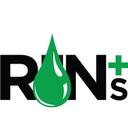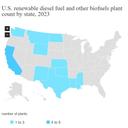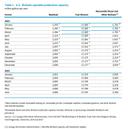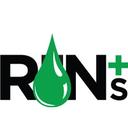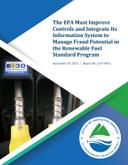North America
The U.S. EPA on Aug. 21 released data indicating nearly 2.04 billion RINs were generated under the RFS in August, up from 1.84 billion generated in August 2022. Total RIN generation for the first eight months of the year reached nearly 15.45 billion.
WestJet Group CEO Alexis von Hoensbroech, on Sept. 19 at the World Petroleum Congress in Calgary, addressed the airline's ambitions to achieve net-zero emissions by 2050 and the vital role SAF plays in the future of decarbonizing aviation.
Clean Fuels Alliance America, American Soybean Association, National Oilseed Processors Association the U.S. Canola Association are urging the Biden administration to adopt GREET for the purposes measuring GHG reductions for the SAF tax credit.
Montana Renewables LLC, a subsidiary of Calumet Specialty Products Partners LP, on Sept. 18 hosted an event to celebrate the first receipts of camelina oil into its biorefinery in Great Falls, Montana. The facility produces renewable diesel and SAF.
Global Biofuels Alliance launches at G20 Summit
President Joe Biden on Sept. 9 joined leaders of India, Argentina, Brazil, Italy, Mauritius and the United Arab Emirates to launch the Global Biofuels Alliance. The launch took place on the sidelines of the G20 Summit in New Delhi.
The U.S. Department of Energy's Bioenergy Technologies Office awarded $18.6 million in funding to eight university and industry projects to develop biomass feedstocks to produce affordable biofuels and bioproducts that reduce GHG emissions.
Neste is disputing a report filed with the USDA that suggests the company may have received fraudulent used cooking oil (UCO) volumes at its renewable products refinery in Singapore, specifically virgin palm oil from Indonesia.
Clean Fuels outlook predicts growing supplies of used cooking oil
Global used cooking oil (UCO) supplies are anticipated to rise from 3.7 billion gallons in 2022 to between 5 billion and 10 billion gallons by 2030, according to a report released by Clean Fuels Alliance America on Sept. 13.
The USDA's National Agricultural Statistics Service predicts soybean production for 2023 will fall to 4.15 billion bushels, down 3 percent from last year, according to the agency's latest Crop Production report, released Sept. 12.
U.S. production capacity for renewable diesel and associated fuels grew by 1.25 billion gallons per year between Jan. 1, 2022, and Jan. 1, 2023, according to data released by the U.S. Energy Information Administration in August.
U.S. operable biofuels capacity was up in June, with gains for both ethanol and renewable diesel and associated fuels, according to data released by the U.S. EIA on Aug. 31. Feedstock consumption was also up during the month.
The Canadian government on Aug. 30 announced it is investing up to $5.3 million in an initiative that aims to support the development of biomass supply chains and cutting-edge technologies to produce biomass and value-added agricultural products.
The U.S. DOE's Bioenergy Technologies Office and the U.S. National Science Foundation have funded three new projects that aim to help accelerate innovation and develop new biomanufacturing approaches.
Minnesota SAF Hub launches collaboration to scale SAF
Through the GREATER MSP Partnership, Bank of America, Delta Air Lines, Ecolab and Xcel Energy have established the Minnesota SAF Hub – the first large-scale SAF Hub in the U.S. committed to scaling SAF production.
Minnesota Department of Agriculture Commissioner Thom Petersen is encouraging the federal government to allow the U.S. DOE's GREET model to be used to calculate GHG reductions for the purposes of the SAF tax credit.
Syngenta Seeds LLC and Sustainable Oils Inc. have entered into a new agreement to sell camelina sativa seed – an ultra-low carbon oilseed crop that can be used as feedstock for sustainable aviation fuel (SAF) and other biofuels.
The American Carbon Alliance on Aug. 23 sent a letter to Internal Revenue Service Commissioner Danny Werfel urging the U.S. Treasury Department to adopt the U.S. Department of Energy's GREET model to calculate the GHG emissions impacts of SAF.
Reps. Jasmine Crockett, D-Texas, and Max Miller, R-Ohio, on Aug. 18 introduced the Farm to Fuselage Act, legislation that aims to update the Farm Bill to facilitate increased domestic production of sustainable aviation fuel (SAF).
The U.S. Department of Energy's national laboratories are helping companies advance sustainable aviation fuel (SAF) technologies by offering customizable pilot plants, laboratory equipment, and even supercomputers.
More than 1.98 billion RINs were generated under the RFS in July, up from 1.71 billion generated during the same month of last year. Total RIN generation for the first seven months of 2023 reached 13.4 billion.
The Surface Transportation Board is soliciting nominations to fill six vacancies on its Rail Energy Transportation Advisory Committee. One of those vacancies is to be filled by a biofuel producer or feedstock provider.
The U.S. EPA on Sept. 21 released updated small refinery exemption (SRE) data, reporting that one new SRE petition has been filed under the Renewable Fuel Standard over the past month. Three SRE petitions are now pending.
The U.S. EPA has indicated its intent to further strengthen program controls and integrate its information system to manage fraud potential in the RFS in response to recommendations made by the agency's Office of Inspector General.
The USDA maintained its forecast for 2023-'24 soybean oil use in biofuel production in its latest WASDE report, released Sept. 12. The estimate for 2022-'23 soybean oil use in biofuel production was revised up.
On Sept. 6, Illinois Gov. JB Pritzker joined state and local leaders to celebrate the groundbreaking of Incobrasa Industries LTD's expanded soybean crushing facility. The project adds 70,000 square feet of new state-of-the-art production facilities.
Clean Fuels Alliance America congratulates Floyd Vergara, director of state governmental affairs, on his upcoming retirement. Vergara announced his intention to retire at the end of September during a recent Clean Fuels Governing Board meeting.
U.S. biodiesel production capacity fell by 169 MMgy between Jan. 1, 2022, and Jan. 1, 2023, according to data released by the U.S. Energy Information Administration in August. The number of biodiesel plants fell by 13.
The USDA on Aug. 30 awarded $266 million to 1,334 renewable energy and energy efficiency projects under the Rural Energy for America Program. Two of the awards will support projects at biodiesel plants.
The U.S. exported 97,462.6 metric tons of biodiesel and biodiesel blends of B30 and greater in July, according to data released by the USDA Foreign Agricultural Service on Sept. 6. Biodiesel imports were at 104,711 metric tons for the month.
In January 2023, U.S. production capacity of renewable diesel and other biofuels reached 3 billion gallons per year, surpassing U.S. biodiesel production capacity for the first time, according to the U.S. Energy Information Administration.
Advertisement
Advertisement

